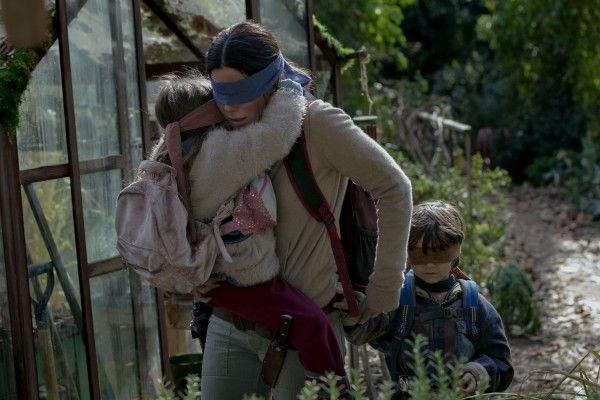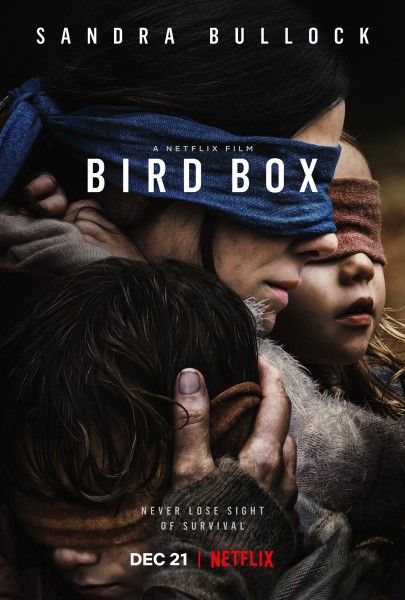Susanne Bier’s Bird Box and John Krasinski’s A Quiet Place start at the same thematic point—the world is a scary place and parents want to block out the bad things to protect their children. While the big literal difference is that Bird Box deals with not seeing anything and A Quiet Place is about not making a sound, the real gulf between these movies is that while A Quiet Place comes from a place of love and trying to hold a family together, the core of Bird Box is selfishness, paranoia, and ugliness. This isn’t so much a choice to make a statement on the world as much as Bird Box is largely a nihilistic, obvious movie where a pandemic is basically just a way for a woman to learn how to be a good mother. So hey, while billions of people died, at least someone was richer for the experience. It doesn’t help that Bird Box faceplants in the first five minutes by trying to hook the audience and instead spoils the entire story.
The film is set in the days, weeks, and months following a mysterious pandemic that causes people to go insane and kill themselves. The only way to avoid this fate is to stay indoors and not look out into the world. The story follows Mallory (Sandra Bullock) an expectant mother who finds herself locked in a house with other survivors. The survivors have to go through the motions of trying to figure out how to navigate a world where they can’t see when they’re outdoors and the moral complications of whether or not they should let anyone into their enclave as a small percentage of those infected don’t try to kill themselves but instead try to force others to look at the evil spirits that cause folks to become suicidal. This goes on for two hours.
The thematic core of Bird Box makes sense—the world has gone crazy and the only way to survive is isolation—but the way it’s realized is so rote and predictable because the story implodes from the very beginning. At this point, I need to go into some spoilers, so if you’re set on seeing Bird Box, you’re going to see what I mean in about the first ten minutes.
Bier wants to try and hook the audience from the very beginning, so it starts with Mallory talking to two children who she only calls “Boy” and “Girl” and giving them very specific, forceful instructions of how they’re going to have to navigate down a river to meet up with other survivors. It’s meant to show that Mallory’s motherhood has been shaped by a need for survival and also convey to the audience the dangers of this world where taking off your blindfold means certain death. Then the story cuts back five years to show the beginning of the pandemic. Since Mallory and her two children are the only people we see at the beginning and we keep cutting back to their journey on the river, it’s safe to assume that none of the other survivors made it. This means we have absolutely no investment in any of the supporting characters, and we’re just biding our time until they die horribly.
There is a base level of shock value and horror watching people commit suicide, but it feels exploitative since the deaths lack meaning. We don’t know these people who are dying, so it comes off as Bier exploiting the shock of suicide itself rather than the loss of an individual. The rest of the people just come off like cannon fodder as we wait to get back to the present and Mallory’s journey with her children. It’s impossible for Bird Box to be scary because it gives the game away in the first ten minutes. The most it can hope for is endangering the children and making our sympathies lie with them, because they’re certainly not with John Malkovich’s Cold Pragmatist or Jacki Weaver’s Optimistic Lady (these characters ostensibly had names, but it was clear there would be no point in learning them).
Bird Box wants you to be afraid, but it doesn’t know how to make you feel that fear. There are monsters that make you kill yourself? Yes, that’s scary, but also not real. The monsters in A Quiet Place are a force, but they’re not really what’s scary. What’s supposed to be scary is the possibility of losing characters we care about, and Bird Box never gets that. It stays stuck at “The invisible monsters will make people commit suicide” and never pushes forward from there. If the best conclusion you can get from the movie is “That woman learned how to be a better mother thanks to the apocalypse,” you’ve failed miserably at both scaring the audience and filming a story worth watching.
Rating: F



